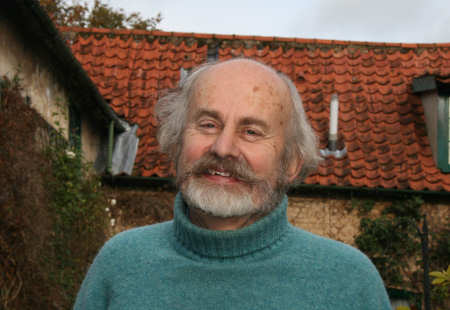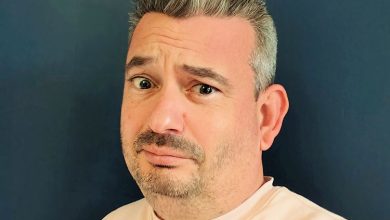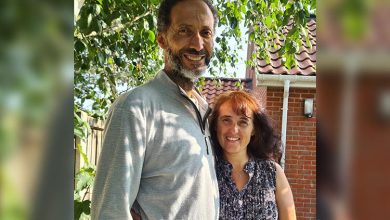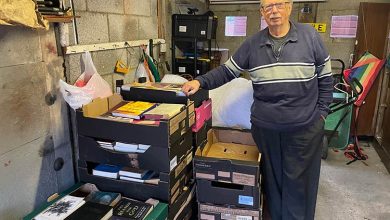Opinion
Trials and inspirations of Norfolk magistrate

After years of prison support work, in November 1992, John found himself incarcerated in Norwich Prison, for a crime he did not commit.
“I was totally helpless,” he said. “If found guilty I could spend years in prison. I knew that all my assumptions about being master of my own destiny were a delusion. I had spent my adult life blinded by my own egotism, believing I could change the world. Now I could not even change my clothes without permission.
“When that cell door closed upon me for the first time, I instantly became aware that I was not alone. A presence calmed me. What I had mistaken for a tragedy was part of His plan.”
After growing up as the son of an Anglican minister and missionary school headmaster in Hong Kong, John had his own personal Road to Damascus experience.
“This was not punishment, but opportunity. Not the loss of freedom, but the discovery of its true meaning. Not death but birth: not rejection but Grace, a call to new life,” said John.
“Most of my hours were spent locked in my cell, which gave me hours to read and write, but mainly I enjoyed the silence, with my new-found personal Jesus.”
After spending six weeks in Norwich Prison, John was completely cleared of the charge on appeal.
Four years later, John became Quaker Prison Minister at Norwich Prison, this time with the keys to come and go and in 2003, he became a magistrate with the presiding judge at the ceremony the very same as at his trial – Judge David Mellor. “His approval was very important to me,” said John.
“I can never forget that I once stood in the dock with a policeman on either side of me. I was always searching for a way forward for the poor unfortunate in front of me – what sentence might assist them towards a better life.”
John tells his full life story in his autobiography, Trials and Inspirations, which has just been published online at www.johnmyhill.wordpress.com
He was born during a tropical thunderstorm in Hong Kong and, at the age of six, the family returned to England where John met a number of well-known authors – he recalls sliding down the banisters at the house of poet Walter de la Mare, playing Pooh Sticks with Winnie the Pooh author AA Milne and being read poems by a mesmerising TS Eliot.
During trips to the Norfolk family home, Church Farm at Hethel, to visit his grandfather, John met sculptor Henry Moore and was read Just So stories by the daughter of Rudyard Kipling.
One evening he also met a friend of his grandfather’s, made while serving in the Boer War – a certain young war correspondent, and then newly-resigned Prime Minister, Winston Churchill. “He arrived looking grim and sad,” recalled John, “but whilst I was getting into bed upstairs, I could hear gales of raucous laughter.”
After studying politics at Hull University, which convinced John not to go into politics as a career, he was taken with the pursuit of knowledge and research into how numerous social networks underpin how society works.
A short period as a nurse at the Norfolk & Norwich Hospital was followed by a return to his research in Hull and in 1972 he married Penny and in 1984 their daughter Stella was born. By this time John realised he needed to find a proper job and took stints as a stockman and tractor driver and then working at a home for the elderly.
A job running a psychiatric hostel followed but John’s marriage was not a happy one and Penny had her own medical and mental problems. Affairs on both sides put a final end to it.
John took a job as a community development worker in Hull and his relationship with his future wife, Denise, developed.
In 1981, Church Farm was left to John after his Aunt Dolly died and in 1985 he moved to Norfolk, soon followed by Denise and her two children Helen and Stuart. In 1986, their daughter Emma was born.
John found a very warm welcome amongst Norwich Quakers and restorative justice and community mediation became interests, as did a job as a night-time project worker at a hostel for homeless men in Wymondham near Hethel.
In recent years, John had been chair of Norwich Central Churches Together and the Quaker representative on the Norfolk & Waveney Churches Together grouping of senior church leaders.
He also played a part in setting up a group of Street Pastors in Norwich, was an active member of the Norfolk Ecumenical Justice Group and in 2005 became a Unite trade union representative.
On October 31, John, at the age of 65, felt it was time to bring all his busyness to an end.
“Quite simply I feel called to lay these things down, “in my prime”, so that I can be more open to the moving of the Spirit. I will go where God sends me and allow for spontaneity and surprises. I am returning to the awe of childhood, to the dreamer that I was; to saying what comes into my mouth, as I believe great grandfather would have done in 1842,” said John.
You can find the full autobiography to download for free at www.johnmyhill.wordpress.com
Pictured above is John Myhill outside Church Farm in Hethel, Norfolk.
Read the full article here







